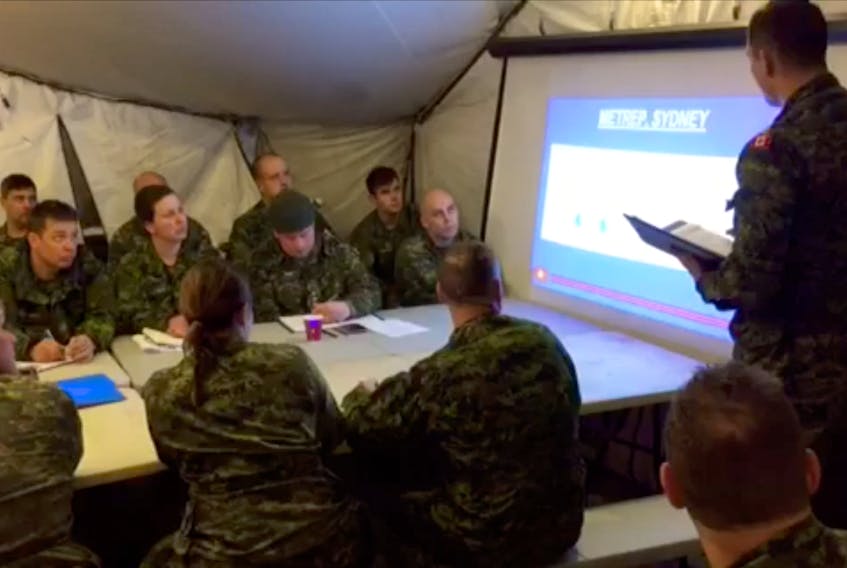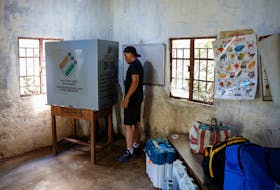A force of 500 soldiers from the 4 Engineer Support Regiment is carrying out a major restoration on the Fortress of Louisbourg National Historic Site in Cape Breton starting Monday as part of Exercise Nihilo Sapper 2017.
The troops out of Gagetown will be restoring the Siege Corridor, the historic pathway used by British soldiers to attack the French fortress in the 1700s, as well as building a bridge over nearby Freshwater Brook with help from Parks Canada archaeologists.
Combat engineers are also repairing the St. Alphonse Church in Victoria Mines, including a roof replacement, together with the local Stone Church Restoration Society.
Construction of roads and critical infrastructure are part of the responsibilities the regiment has within the military. The Louisbourg siege trail and the stone church restorations allow the soldiers to practice these skills, explained Lieutenant-Colonel Chris Cotton.
However, they will not only learn and practice their skills on these historical restorations. As combat engineers they must be also ready to do this in a wartime setting. For those in Cape Breton, they will work as if they are in hostile territory infested with roadside bombs and under the threat of attack.
This is in keeping with 4 Engineer Support Regiment’s traditional role, which is building facilities such as camps and roads to support Canadian military operations, from fighting insurgents abroad to providing disaster relief at home.
Before deploying in Louisbourg and elsewhere, soldiers built a 500-person camp near Sydney’s Open Hearth Park, complete with heated tents housing sleeping quarters, showers, a kitchen and a mess hall, medical tent, command post and a vehicle refueling post.
Soldiers have also built smaller forward operating bases in off-site training areas around Cape Breton, as they would on foreign deployments.
The camp was surrounded by razor wire fencing and concrete revetments manned by soldiers to keep intruders out.
The Sydney camp was built just months after the regiment constructed a similar base in Latvia to house a Canadian-led NATO force, deployed to help defend that country against a possible Russian attack.
Cotton said that when deploying in the field, the army had three options: build its own facilities or use existing military or civilian buildings.
“The second two options often requires us to refurbish them up to Canadian standards or to whatever we need for that particular operation, so taking an existing building and doing some refurbishment work to it is exactly within our [role] as a general engineer support regiment,” said Cotton.
Troops taking part in Nihilo Sapper are also practising how to detect and defuse improvised explosive devices in the Blue Mountain region, using mine-resistant ambush protected vehicles.
These armoured vehicles are designed with v-shaped bottoms to deflect IED blasts away from soldiers inside, as well as a heavy machine gun on top to beat off ambush attacks. Such vehicles were often used by American and allied forces against insurgents in both Afghanistan.
Combat engineers are also restoring the Warren Lake Bridge in the Cape Breton Highlands National Park and deploying heavy equipment to renovate a snowmobile trail in Wreck Cove.
The regiment’s combat diving team is conducting joint training with the Royal Canadian Navy’s, Fleet Diving Unit (Atlantic) at the Canadian Coast Guard College in Westmount.
While recreating conditions in war zones is nearly impossible, Cotton felt it was important for his regiment to leave their home base at Gagetown and engage with the local community to push themselves and test their readiness.
“There are certain things that we can do to challenge ourselves to learn some of the same lessons that we would be facing overseas and one of the things that we can challenge ourselves with is to pick ourselves up out of our normal comfort zone.”
Exercise Nihilo Sapper 2017 runs from Nov. 1 to 24.
Army engineers brave ‘hostile’ Cape Breton terrain to rebuild parts of Fortress Louisbourg in exercise
Setting provides soldiers with chance to hone skills in combat and construction

STORY CONTINUES BELOW THESE SALTWIRE VIDEOS








